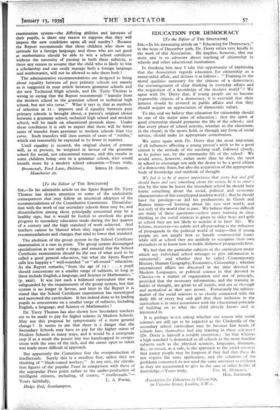EDUCATIOIsi FOR DEMOCRACY
[To the Editor of THE SPECTATOR]
SIR,—In his interesting article on " Educating for Democracy," in the issue of December 3oth, Dr. Derry refers very kindly to the work of this Association. He implies, however, that our main aim is to advocate direct teaching of citizenship in schools and other educational institutions.
In thanking him may I take this opportunity of explaining that the Association regards education for citizenship as a many-sided affair, and defines it as follows : " Training in the moral qualities necessary for the citizens of a democracy, the encouragement of clear thinking in everyday affairs and the acquisition of a knowledge of the modern world " ? We agree with Dr. Derry that, if young people are to become responsible citizens of a democracy, it is essential that their interest should be aroused in public affairs and that they should acquire an appreciation of democratic values.
To this end we believe that education for citizenship should be one of the major aims of education ; that the spirit of good citizenship should permeate the life of the school ; and that every phase of school activity, whether in the classroom, in the chapel, in the sports field, or through any form of social service, should make its appropriate contribution.
We agree again with Dr. Derry that the most important of all influences affecting a young person's wish to be a good citizen is the attitude of the teaching staff, followed closely, as he points out, by the community life of the school. We would stress, however, rather more than he does, the need in school to encourage not only the desire to be a good citizen of a democratic State, but also the acquisition of the appropriate body of knowledge and methods of thought.
We feel it to be of urgent importance that every boy and girl should know and care something about the society he is to enter ; that by the time he leaves the secondary school he should have learnt something about the social, political and economic characteristics of this complicated modern world ; that he should have the privilege—as did his predecessors in Greek and Roman times—of learning about his own real world, and not only of the world that is past. We believe that—so difficult are many of these questions—unless some training in clear thinking in the social sciences is given to older boys and girls at school they are not likely to acquire it in later life. We believe, moreover—so subtle and all-pervading is the influence of propaganda in the political world of today—that if young people are not taught how to handle controversial issues while still at school they are unlikely to recognise their own prejudices or to know how to tackle dishonest propaganda later.
We feel that the particular subjects of the curriculum under which any individual school arranges to give information is immaterial ; and whether they be called Contemporary History, Human Geography, Economics, Citizenship ; whether international affairs are discussed in the time devoted to Modern Languages, or political science in that devoted to Classics—is a matter of organisation and not of principle, provided that the necessary information, and the training in habits of thought, are given to all pupils, and are as thorough and methodical as their ages permit. Fortunately the subject- matter of the social sciences is so closely connected with the daily life of every bOy and girl that their inclusion in the curriculum is in strict accordance with the educational principle of building on to what the child already knows and is interested in.
It is perhaps wcr.h asking whether one reason why social sciences are still apt to be regarded as the Cinderella of the secondary school curriculum may be because few heads of schools have themselves had any training in these sciences ? (Dr. Derry is himself a notable exception.) So that whereas a high standard is demanded in all schools in the more familiar subjects such as the physical sciences, languages, literature, &c., so casual, as a rule, is the approach to the social sciences that young people may be forgiven if they feel that these do not require the same application, and the solutions of the problems concerned do not need the same attention to evidence as they are accustomed to give in the case of other bodies of Hon. Secretary.
Association for Education in Citizenship, to Victoria Street. London, S.W.i.






































 Previous page
Previous page